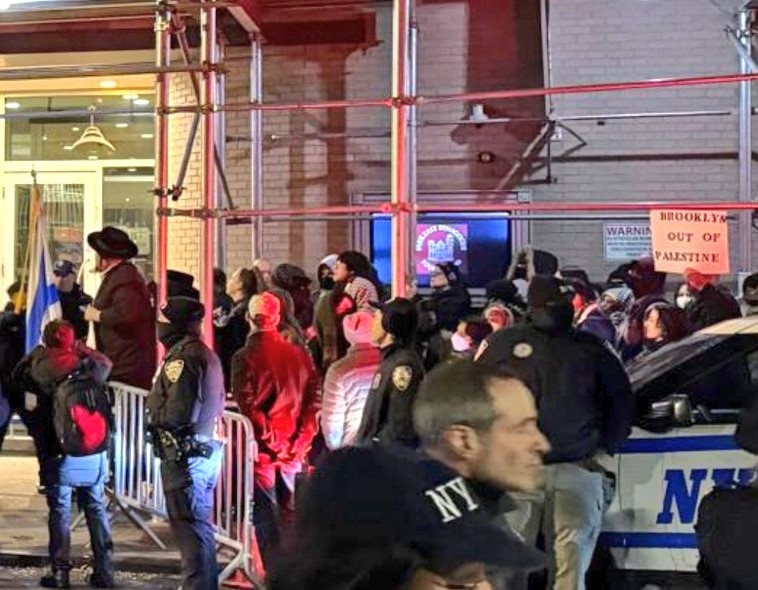By Danielle Arfin
The North Carolina Democratic Party is facing backlash from Jewish voters and moderate Democrats after its executive committee voted last month to endorse a resolution calling for an immediate military embargo against Israel. Passed narrowly by a vote of 161 to 151, the resolution accuses Israel of operating an “apartheid” system and alleges human rights abuses, while calling for the suspension of U.S. military aid until external organizations certify that Israel has ended these practices.
While the resolution is non-binding and does not impact federal policy, Jewish leaders warn that the message it sends is unmistakable: Jewish suffering is being erased, and antisemitic narratives are gaining ground within mainstream American politics.
Local Jewish leaders in North Carolina described the vote as both deeply painful and politically reckless. Rabbi Asher Knight of Charlotte’s Temple Beth El stated that the resolution “ignores the trauma of October 7, ignores the ongoing threats to Israeli civilians, and ignores the rise in antisemitism affecting Jewish families here at home.” Rabbi Fred Guttman, a long-time advocate within the Democratic Party, criticized the resolution as “extreme” and “one-sided,” arguing that it alienates Jewish voters and undermines the party’s efforts to present itself as inclusive. “This resolution does nothing to help elect Democrats,” Guttman said. “It simply bashes Israel.”
For many Jewish families in North Carolina, the resolution has turned the Democratic Party into a space where they feel unwelcome. One Jewish mother from Raleigh, who asked not to be named, said her family unsubscribed from party communications after the vote. “It’s not just politics anymore. It’s personal. When Jewish children are killed, and their lives aren’t even mentioned in these debates, we understand exactly where we stand.”
The controversy in North Carolina is part of a growing national trend. Similar anti-Israel resolutions have emerged within Democratic Party chapters in Wisconsin and Washington state. National polling indicates that Democratic voter sentiment toward Israel is shifting rapidly. A recent Gallup poll found that 59 percent of Democrats now sympathize more with Palestinians than Israelis, a dramatic change from prior decades.
This shift, while significant, comes at a cost. According to the Anti-Defamation League, 2024 saw more than 8,800 reported antisemitic incidents in the United States, the highest number on record. In North Carolina, Jewish parents report growing concerns over their children’s safety in schools, describing increases in anti-Jewish rhetoric and isolation. The fear among many is that party resolutions like the one passed in North Carolina are not merely symbolic, they help legitimize and normalize the exclusion of Jewish narratives from progressive causes and public discourse.
National Democratic leaders are watching closely. Kathy Manning, chair of Democratic Majority for Israel, called the North Carolina resolution “deeply troubling” and warned it could damage the party’s prospects in key swing states ahead of the 2026 midterms. Internal party analysts have voiced concern that debates over Israel are dividing Democrats at a time when unity is critical to their electoral success. In Michigan, dissatisfaction over the party’s handling of Israel contributed to nearly 13 percent of Democratic primary voters choosing “uncommitted” ballots, a shift that some argue helped hand Donald Trump the state.
In North Carolina, the vote has exposed fault lines that may prove difficult to repair. Amy Block DeLoach, vice president of the party’s Jewish Caucus, lamented the outcome. “Every time we’re forced to fight this battle internally, that’s time and energy we’re not spending on winning elections,” she said.
For Jewish families, the resolution has raised uncomfortable questions about their place in the party many have long called home. With antisemitism rising across the country, and with public debates increasingly ignoring Israeli victims, many feel their concerns are being written out of the conversation.
What happened in North Carolina may be just one vote. But for Jewish parents watching their children face hostility in schools and online, it feels like another sign of something far bigger: that the world’s oldest hatred is finding new ways to thrive, even within the institutions they once trusted.








7 Responses
North Carolina hates Jews. Time to leave this slum.
I am deeply disturbed by the direction of the NC Democratic Party. As a lifelong Democrat, I will not be voting for any NC Dem. who dares not speak up about antisemitism and comments on the Middle East with a biased lens against Israel. Sadly, this will be the further downfall of Democrats, and it won’t be the Republicans’ fault. I am reminded of the Commodore Perry quote, “We have met the enemy and they are ours.”
Progressives are not progressive and will be the death of this country long after Trump is gone.
Additionally this part also passed a resolution that labels Israel as an apartheid state.
That has a l I fe long drmocrate I have left the party and become an independent left part of party is totally anti semetic anti israel pro hamas pro palastinian democrates will never win house or senate for a long time party is home of anti semetism
This a recurrent and ongoing issue. I was censored by the NCDP for speaking out against a “Progressive” Democrat for his support and stance on the anti Jew and anti Israel BDS movement.
Yes – the party tried to limit Stephen’s right to disagree with a so called “progressive” activist. I was there – on zoom – it was disgraceful. Apparently we are not allowed to disagree with these guys.